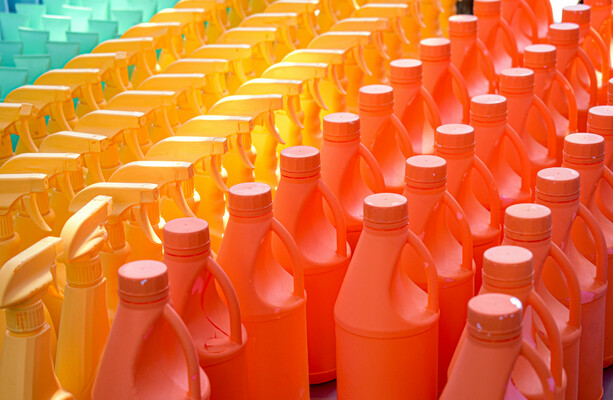In a recent report, the Environmental Protection Agency issued a stern warning: Coming targets for plastic packaging recycling will be « extremely difficult » for Ireland to reach.
Ireland is currently within the EU allocation, with 22.5% of plastic packaging recycled in 2019 – but those targets are set to rise to 50% in 2025 and 55% in 2030.
Ireland will need to reverse negative trends and more than double the proportion of plastic packaging currently recycled.
waste action plan Posted in September explained that the government intends to achieve national targets on specific forms or packaging products, such as food or drink cans; Make all packaging on the Irish market reusable or recyclable by 2030; And offer the long-awaited deposit and return scheme.
The plan noted that « EU statistics show that Ireland appears to produce more plastic packaging per capita than all other member states. »
Elsewhere in the European Union, France imposed a ban at the beginning of this year on plastic packaging for most fruits and vegetables, and Spain is set to follow suit in 2023.
the magazine Talk to experts about plastic packaging recycling and whether a procedure like France would work in Ireland.
- Our colleagues at Noteworthy want to know where the soft plastic in our recycling bin ends up. See how you can support this project here.
Bye
French President Emmanuel Macron has described France’s latest move against plastic as a « revolution ».
From New Year’s Day, the state has banned plastic packaging on the most common fruits and vegetables, such as bananas, oranges, peppers and cucumbers.
Cut fruit, processed fruit, and packages over 1.5kg are currently exempt.
Some soft fruits such as berries and cherry tomatoes are not yet included in order to give producers more time to find alternatives to plastic.
By 2026, the country plans to phase out plastic packaging for all whole fruits and vegetables, and Spain will implement a similar ban on products next year.
Talking to the magazine« Waste reduction and prevention is at the heart of waste policy, » said Tara Higgins, EPA’s senior administrator.
“When an alternative is readily available,” measures like those implemented in France “would be a good thing because at the end of the day, even when packaging can be recycled, there is still a carbon footprint associated with the generation, manufacture of plastic and then transportation.”
« finally, [we need] Prevention and reduction in the first place, then recycling in terms of next [action] down in the waste hierarchy.”
“I think banning all plastics, that kind of message is not realistically helpful. You have to think about where there are alternatives, replaceable alternatives, readily available, where we can make a difference.”
« When it comes to packaging, it’s about trying to reduce rather than outright ban, » she said.
This is partly due to one important factor – avoiding food waste.
food protection
Packaging can help foods like fruits and vegetables last longer, which in turn reduces food waste which also has negative environmental consequences.
Higgins identified that policies related to packaging reduction need to strike a balance between food safety and preservation.
Similarly, Repak CEO Seamus Clancy said food safety is a « huge » part of the picture.
“Good, safe packaging actually reduces food waste,” Clancy said.
“If you take the likes of a cucumber, for example, if you put a plastic sheet on a cucumber, you increase its shelf life to 10 to 14 days. If you don’t have that on the cucumber, it will survive three to five days.”
Reusable packages that can be brought in are welcome, whether for milk, cereal or powder.
“There should also be parallel legislative support for the retail sector against insurance claims, because this is an issue within food safety. Food safety comes first.”
Million tons of packaging waste
Ireland generated more than 1 million tons of packaging waste in 2019 for the third year in a row, according to a recent study by the Environmental Protection Agency.
Overall, 62% of packaging waste was recycled in 2019.
This was down from 64% in 2018, but still exceeds the current EU target of 55%.
However, recycling rates have been on a downward trend since 2013, and the EPA predicts that stricter targets in the near future – 65% from 2025 and 70% from 2030 – will be more difficult for Ireland to reach.
In particular, targets set for plastic packaging recycling – 50% from 2025 and 55% from 2030 – will be « extremely challenging ».
Of the nearly 320,000 tons of plastic packaging waste generated in Ireland in 2019, only 28% was recycled – although we are on track to reach targets for recycling other types of packaging such as glass, wood and metal.
The Environmental Protection Agency has recommended implementing targeted measures to phase out the use of packaging materials that are difficult to recycle.
He also called for better waste sorting and collection systems, such as deposit return schemes; Expand the range of materials that waste operators can accept for recycling; and implementation of the Waste Action Plan for the Circular Economy Strategy (published in September).
The pandemic has not made reducing plastic packaging any easier.
“Before the COVID-19 pandemic, we were seeing a huge improvement in bulk food in all the major complications in the country, making the choice available to the consumer,” Clancy said.
“We saw right away when Covid happened that it came back overnight. Consumers didn’t want to buy anything that was available for fear of Covid at the time.
“Another fundamental issue is that we are still waiting for guidance on a number of new packaging waste directives – the Waste Framework Directive and the Landfill Directive that has yet to come from Europe to align with the Circular Economy Package and Single Use Plastics Directive.”
Single-use plastics
This latter policy was introduced in July 2021 when plastic straws, cutlery, cotton buds and other single-use plastic items were removed from the market.
An EU directive restricting some single-use plastic products went into effect last year after environmental moves pointed to them as a waste source in the mid-to-late 2010s.
But the ban was implemented despite objections from people with disabilities who identified a wide range of reasons why single-use plastics are such an important tool in their lives.
One expert said that future decisions on reducing plastic packaging waste should be made in consultation with people with disabilities they affect the magazine.
“Although many people with disabilities need plastic straws, they are still moving forward with the decision to ban single-use plastic straws,” said Peter Kearns, project manager of the ONSIDE outreach program of the Independent Living Movement Ireland.
“If you go to get a cup of coffee from a local coffee shop, many of them have biodegradable straws, but once they reach the hot water in the coffee or tea, they fall apart. They are unusable,” he said.
No news is bad news
magazine support
for you contributions You’ll help us keep delivering the stories that matter to you
Support us now
“I just cleaned out the utility room at home last week and there is an entire shelf full of plastic straws I bought in 2019 that I hope will benefit me for the rest of my life.
“People say, ‘How about paper straws,’ but they don’t work with us. We’re very happy to get to a point where there is a straw that works for us, but it’s part of a larger discussion.
It’s not just a matter of plastic straws – the danger is that the voices of people with disabilities are not heard and completely ignored.
Looking ahead, Kearns said the government should « create systematic platforms where there is a dialogue with the disabled and activists ».
“It is about creating a platform where there is the appropriate dialogue, not consultation, but the appropriate dialogue with people with disabilities and organizations.”
55% by 2030
Ireland has set a goal of halving emissions by 2030 – now a well-known climate target that guides policy.
But in the field of recycling, the challenging target of 55% of all plastics being recycled is also ahead in 2030.
“We have a target of 50% of all plastics being recycled by 2025 and 55% by 2030. That is the biggest challenge we face. This is all-consuming for us,” Clancy explained.
« At the highest level, we need to reduce the amount of plastic being put on the market, and non-essential plastics, » he said.
Next, we have to make sure that the plastics used are recyclable. And third, we have to make sure it’s easy for the consumer.”
Clancy said we need to « ensure that the next steps we are taking are in line with the requirements from Europe, as well as in terms of how we can best import essential foods into Ireland in the safest manner so that the consumer can purchase them in this context ».
“What the French have done, they are ahead of the European Union in that step, but whatever works we will definitely look at in the future.
« The overriding issue then is connectivity, getting the consumer, businesses and society at large to understand what is needed in the context of how we can best protect our environment. »



:quality(70)/cloudfront-eu-central-1.images.arcpublishing.com/irishtimes/B2UKYWVZN27ONWHPKAI76KXT6U.jpg)
:quality(70)/cloudfront-eu-central-1.images.arcpublishing.com/irishtimes/MGTN4QS63NNJXN37YBUGGZT24A.jpg)








